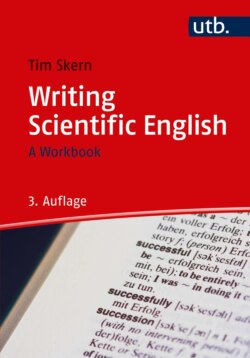Читать книгу Writing Scientific English - Timothy Skern - Страница 13
1.1.1British or American?
ОглавлениеStudents have many questions at the beginning of a new course. The above question concerning the English to choose for their spellchecker is the most common. A frequent variant, often posed by post-graduate students and post-docs, is whether American English must be used to write a manuscript that will be submitted to an American journal. The answer to both questions is that it is not important which variant of English you choose. It is far more important that your English is clear, comprehensible and concise. An editor of a journal will not reject a manuscript because the spelling, vocabulary and punctuation are from an English-speaking person situated on another continent. Setting commas in the American way or writing “sulphate” instead of “sulfate” will not affect the fate of your manuscript. Once a journal accepts a scientific manuscript for publication, the production department will use its own spellchecker and software to put the manuscript into the style of the journal.
If you are just beginning to write scientific manuscripts, consider using American English. Two characteristics make it easier to learn and to use. First, spelling in American English is simpler and less perverse than in British English. Second, American English is younger than British English. The grammar of American English has, as predicted by Schopenhauer, become less perfect than British English. One example of this greater simplicity is the absence from American English of certain prepositions that British English absolutely requires. Thus, the British journal “Nature” might write “On Monday, the students protested against the removal of scientific writing from their curriculum.” In contrast, the American journal “Science” would structure the sentence with two fewer prepositions: “Monday, the students protested the removal of scientific writing from their curriculum.” The use of prepositions in any language is usually tricky. Anything which eliminates two of them at a stroke must make a writer's life easier.
Further evidence to support the hypothesis that American English is simpler than British English comes from a comparison of the names of musical notes (box 1.3). The American system is straightforward and logical. The British system is complicated and not very informative. Three of the words say nothing about the property of the note. The word “semibreve” seems to indicate half of something, but it actually describes a full note. The word “breve”, meaning two notes, did exist, but it has become obsolete. There are many other examples of illogical words in British English. Non-native speakers may even have the feeling that the team of Monty Python's Flying Circus was involved in developing British English. The habitually bizarre and unpredictable nature of British English was perhaps one of the reasons why Monty Python's Flying Circus could only have originated in Great Britain.
In summary, do not waste time thinking about your choice of English. Concentrate instead on the guidelines and suggestions in this and the following chapter. They are much more likely to improve the quality of your manuscript than your choice of English. Readers will remember the quality of your manuscript and its advance in knowledge. They will not remember whether your manuscript contained American or British English.
Box 1.3Names of musical notes
| Musical note | American English | British English |
| full note | semibreve | |
| half note | minim | |
| quarter note | crotchet | |
| eighth note | quaver | |
| sixteenth note | semiquaver | |
| thirty-second note | demisemiquaver | |
| sixty-fourth note | hemidemisemiquaver | |
| hundred twenty-eighth note | semihemidemisemiquaver |
